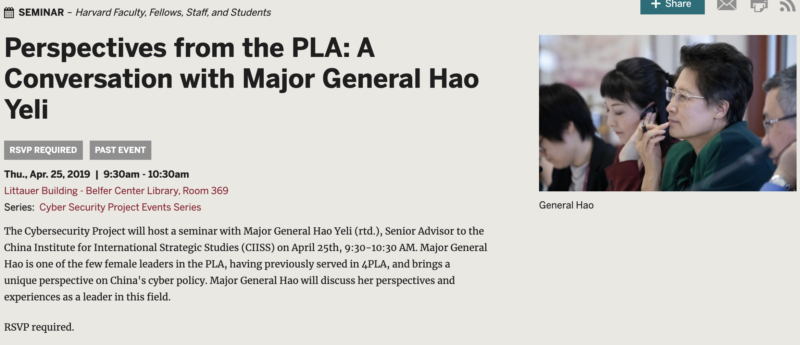
by Natalie Winters
Compromised Conferences.
The National Pulse can reveal the center has hosted cybersecurity working groups alongside Chinese Communist Party government and military officials, despite China’s repeated poaching and hacking of U.S. technology:
The working group in Cambridge brought together 20 representatives including former government and military officials, as well as tech, business, and academic professionals to discuss current issues in the bilateral cyber relationship.
The group roleplayed “fictitious cyber scenarios” and discussed sensitive technology matters relating to artificial intelligence, Huawei, arms control frameworks, and more:
Both sides worked through a fictitious cyber scenario to discuss what their respective governments and companies would do in the face of a third party cyber attack on critical infrastructure. The working group also discussed AI, IP theft, supply chain security and Huawei, arms control frameworks, and controlling the spread of malware over the dark web.
Pictures from the event reveal People’s Liberation Army General Hao Yeli in attendance:

The conference is held alongside the China Institute for International Strategic Studies (CIISS), which boasts participation from Chinese Communist Party “political figures, diplomats, military scholars, economists, public figures and academicians.”
The Beijing-based group’s leadership is entirely comprised of former Chinese Communist Party officials, often high-level, or former leadership of Chinese government-run bodies. Similarly, every member of the group’s academic committee has either worked directly for the Chinese Communist Party or a state-run organization.
Group members have been repeatedly seen their works published by the Press of the Party School of the Chinese Communist Party’s Central Committee, including “How to Become a Great Power: World Order and China’s Role” and “The 500-Year History of Socialism.”
Nonetheless, the Harvard center felt comfortable swapping cybersecurity tips with the group, even inviting its Senior Adviser, General Hao, for a speech, “Perspectives from the PLA: A Conversation with Major General Hao Yeli.”

Biden’s Buddies.
A host of high-level advisers in the Biden White House appear to have no issues with the aforementioned liaising with the Chinese Communist Party and its military.
Ash Carter, an Obama-era Secretary of Defense, leads the Belfer Center, and Eric Rosenbach, fellow Obama administration national security alum, leads the China initiative.
Jake Sullivan, Biden’s National Security Adviser, has served as a Senior Fellow at the Belfer Center.
What’s more, Biden’s Director of National Security Avril Haines – who recently hesitated to call China a “competitor” and instead opting for “global competitor” – appeared on the center’s “Office Hours” podcast in October 2017.
On the episode, Haines discusses her rise to power within the Obama White House as Deputy Director of the Central Intelligence Agency (CIA) and North Korea.
“The relationship between North Korea and China is a fascinating one,” she notes.
Haines, Sullivan, and Secretary of State Antony Blinken also signed a Belfer Center-backed letter advocating for collaboration between the U.S. and China to “develop” a vaccine and insisting the U.S. can rely on China for “protective gear and medicines needed to fight the virus.”…
Continue Reading